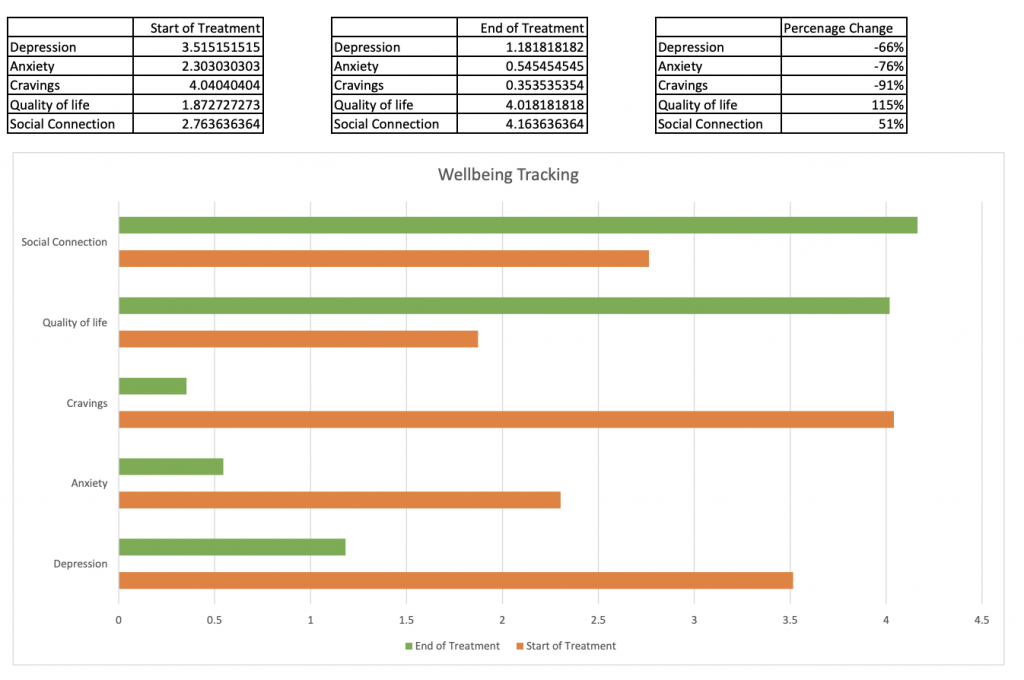What’s included?
- Introduction
- Quantifiable progress
- Evidence-Based Practices
- We get better everyday
- Personalised Treatment
- Accountability and Transparency
- Research and Wider Change
- Conclusion
At Delamere we provide vital support to individuals facing a wide range of issues from addiction to work burnout. These issues can come with a range of underlying challenges such as depression, anxiety, cravings, low overall quality of life, and social disconnection. To ensure the effectiveness of our program at Delamere, tracking outcome data has become a crucial practice. By measuring and analysing outcomes in 5 specific areas, we are able to gain valuable insights into our guests’ progress and make informed decisions to enhance treatment plans as well as looking at the things we are doing well and the areas in which we can continue to improve outcomes.
In using a comprehensive survey, we can measure five key areas that significantly impact wellbeing: anxiety, depression, cravings, quality of life, and social connection. Before guests embark on a series of interventions at Delamere, it is essential for us to establish a baseline by having individuals complete the survey. This initial assessment provides a snapshot of how guests present on admission. After completing their stay with us and having taken part in psycho-education groups, group therapy, 1-1 therapy, 1-1 recovery mentoring and experiential interventions, the same survey is administered once more to gauge effectiveness. This comparative analysis allows for a clear understanding of the impact of Delamere’s treatment model and aids in creating tailored strategies to enhance overall wellbeing. The same survey is issued to guests as they progress through our Aftercare program, which runs for 12 months post the residential component.

Quantifiable Progress
Tracking outcome data allows us to measure and quantify our guests’ progress in a structured and objective manner. By collecting data on indicators such as depression, anxiety, and cravings, we are able to assess the effectiveness of the interventions we use over time. This data-driven approach empowers our team to make informed decisions and tailor treatment plans to meet the individual needs of each of our guests more effectively. Regular monitoring of outcome data provides concrete evidence of progress and helps determine how we can do better everyday, one of our most important values.
Evidence-Based Practices
Outcome data tracking enables us to adopt evidence-based practices. By analysing outcomes across different interventions and treatment modalities, we can identify which approaches offer our guests the best results for specific guests or conditions. This information helps refine and optimise the treatment Delamere provides, ensuring that guests receive the most effective and evidence-based care available. Tracking outcome data also allows us to stay updated with the latest research and incorporate innovative techniques into our approach.
We get better everyday
Through the collection and analysis of outcome data, Delamere is able to identify areas in which we can grow. By monitoring guests’ quality of life and social connection, we can assess the overall impact of our program beyond symptom reduction. This data can guide the development of new interventions, therapies, or support services that enhance guests well-being and ensure a holistic approach to recovery. By continuously analysing and acting upon outcome data, we are able to evolve and refine our program to provide the best possible outcomes for our guests.
Personalised Treatment
Tracking outcome data means that Delamere’s recovery team is able to develop personalised treatment plans for each of our guests. By monitoring individual progress and overall well- being we’re able to tailor treatment approaches to address specific needs effectively. This person-centered approach increases the chances of positive outcomes. This is due to guests receiving interventions that are aligned with their unique circumstances, preferences, and goals. Outcome data tracking allows our team to adapt and modify treatment plans as needed, ensuring that guests receive the most appropriate and effective care throughout their recovery journey.
Accountability and Transparency
By tracking wellbeing outcomes at Delamere, we promote accountability and transparency within the team and with our guests. By measuring and reporting outcomes, we demonstrate our effectiveness to guests, families, referring professionals, and other stakeholders. Transparently sharing our outcome data builds trust and confidence in the treatment provided, empowering patients and their families to make informed decisions when choosing a Delamere. Additionally, accountability ensures that we do the right thing and that we get better every day – two of our values here at Delamere.
Research and Wider Change
By tracking outcome data, we can contribute to research efforts and collaboration among professionals in the field. Once aggregated and anonymised our data could inform research, allowing for the identification of trends and patterns in recovery outcomes. This approach supports the continuous improvement of treatment practices and the advancement of knowledge in the field of addiction recovery and mental health. By participating in research and sharing outcome data, we can actively contribute to the collective understanding of effective treatment approaches, benefiting the broader community.
Conclusion
Tracking outcome data is a powerful tool for us here at Delamere. By measuring and analyzing outcomes related to depression, anxiety, cravings, quality of life, and social connection, we can optimize our treatment approaches, personalise care, and ensure continuous improvement.






